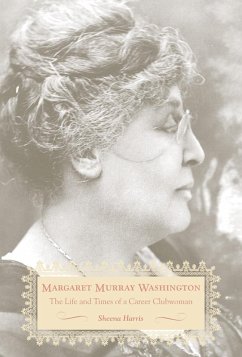Born enslaved in 1861, by 1892 Margaret Murray Washington of Macon, Mississippi, married the twice-widowed race leader Booker T. Washington and joined the ranks of the rising black middle class. While one cannot discount the accomplishments of her storied husband, Washington's own successes warrant further exploration. In this first biography of Margaret Murray Washington, author Sheena Harris discusses Washington's importance as an active clubwoman, educational reformer, and integral partner to her husband and his success with the Tuskegee Institute.
Individual black, female leadership continues to be a blind spot in much scholarly historical literature. Washington was an important educator and clubwoman whose influence emanated from her own planning and actions. As Lady Principal, Washington was sincere and earnest in her campaign to improve Tuskegee Institute. She also transformed her community through her local club organizations. In addition, Washington cofounded the National Federation of Afro-American Women (1895) and the National Association of Colored Women (NACW) (1896). Harris illustrates how Washington improved race relations as a whole through local and national organizations such as the Tuskegee Woman's Club, the NACW, and 1922 creation of the International Council of Women of the Darker Races (ICWDR). Harris explains clearly that Washington took her leadership positions seriously and strategically worked to expand opportunities for blacks through such organizations.
Washington's life provides a glimpse into the inner workings of the Black Women's Club Movement and illuminates the experiences of a race woman who came of age during the Jim Crow South. Harris's biography is a convincing portrait of an under-studied black woman in the early civil rights movement and places Washington within the pantheon of other important women of the era.
Hinweis: Dieser Artikel kann nur an eine deutsche Lieferadresse ausgeliefert werden.
Individual black, female leadership continues to be a blind spot in much scholarly historical literature. Washington was an important educator and clubwoman whose influence emanated from her own planning and actions. As Lady Principal, Washington was sincere and earnest in her campaign to improve Tuskegee Institute. She also transformed her community through her local club organizations. In addition, Washington cofounded the National Federation of Afro-American Women (1895) and the National Association of Colored Women (NACW) (1896). Harris illustrates how Washington improved race relations as a whole through local and national organizations such as the Tuskegee Woman's Club, the NACW, and 1922 creation of the International Council of Women of the Darker Races (ICWDR). Harris explains clearly that Washington took her leadership positions seriously and strategically worked to expand opportunities for blacks through such organizations.
Washington's life provides a glimpse into the inner workings of the Black Women's Club Movement and illuminates the experiences of a race woman who came of age during the Jim Crow South. Harris's biography is a convincing portrait of an under-studied black woman in the early civil rights movement and places Washington within the pantheon of other important women of the era.
Dieser Download kann aus rechtlichen Gründen nur mit Rechnungsadresse in A, D ausgeliefert werden.
Hinweis: Dieser Artikel kann nur an eine deutsche Lieferadresse ausgeliefert werden.









